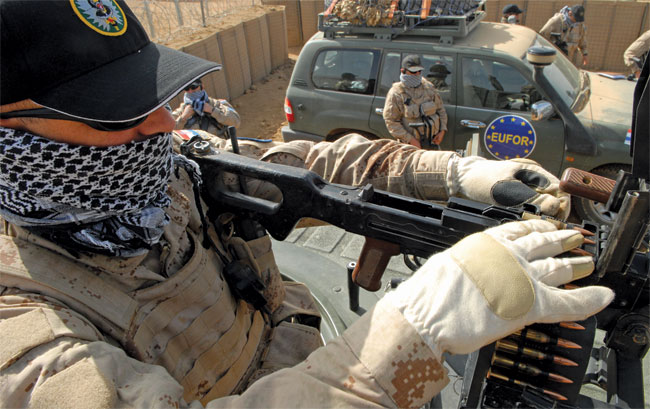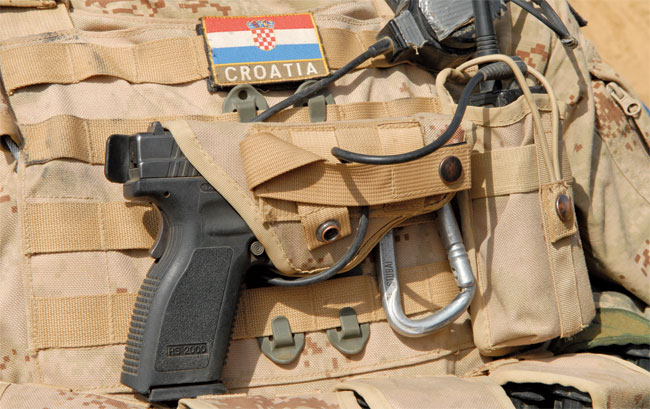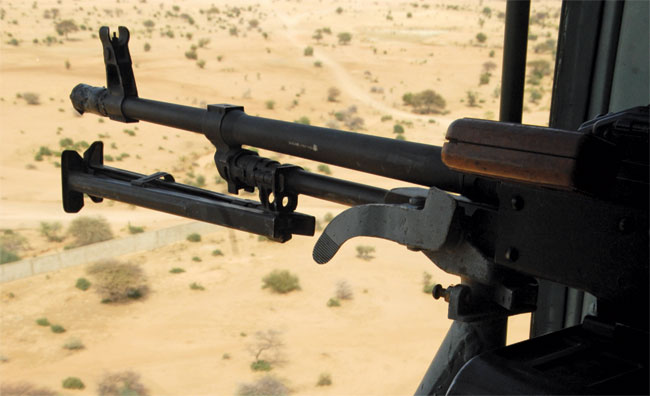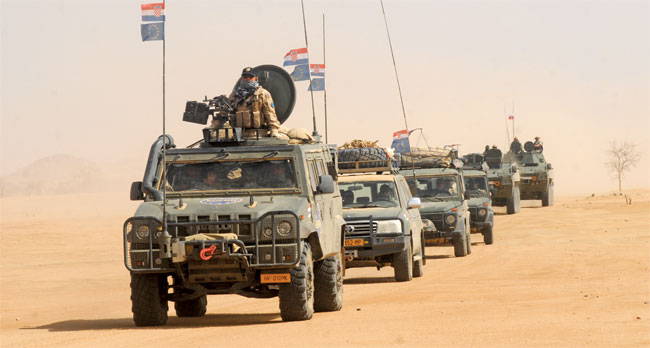ABOVE: At the ready on patrol in the Chad desert – looking over the PKM turret mount.
History/Development of the Conflict
Since it gained independence, Chad has been shaken by numerous armed risings, invasions of the neighboring military, conflicts regarding borders and scuffles among political leaders. Since 1973 the northern part of the country was placed under control of the guerrilla insurgents supported by Libya, but with French help the uprising was repressed and operations of Libyan troops were suppressed.
Idriss Déby came to power by overthrow in 1990. He won elections in 1996, 2001, and 2006, and after a referendum he was entitled to change the constitution and the third mandate.
Military uprising in the north of Chad began in 1998 under leadership of Déby’s ex-Chief of Defense, Youssof Togimi, who headed the Movement for Democracy and Justice in Chad (MDJT). That three-year civil war ended by signing a peace treaty between the government and insurgents of the MDJT movement.
In 2003 and 2004, conflicts in the neighboring Sudanese region Darfur resulted in a wave of Sudanese refugees and skirmishes of Chadian army with rebel groups inclined to Sudanese central government.
The so-called Libyan Agreement was signed in Tripoli in February 2006, under auspices of LTC Gaddafi. It bound the Presidents of Chad (Idriss Déby) and Sudan (Omar al Bashir) to normalize diplomatic relations and discontinued every support provided to rebel groups in their territories.
In August 2006, Sudanese President al-Bashir was at Déby’s inauguration for the third presidential mandate. Diplomatic relations between Chad and Sudan were reestablished on that occasion. At that time Chad also opened diplomatic relations with Iran.
A coup and attempt on Déby’s life was impeded in March 2006, with help of French troops deployed in Chad. It is regarded that about 300,000 refugees from Darfur are situated in Chad.
Rebels who wanted to dethrone Déby entered the capital in early February 2008, encircled the palace and demanded of the President to step aside. France reacted by deploying about 1,500 of its soldiers tasked with providing security to European citizens in the city.

Chadian authorities reported that rebels who advanced very quickly in the course of the week from part of the country that borders with a region of Sudanese Darfur affected by conflicts were supported and armed by the Sudanese government. Khartoum refuted such accusations.
The Military Council of the UN condemned the rebels’ attack on the capital of Chad and gave France and other countries the green light to help Chadian authorities to throw the rebels back.
Jean-Marie Guehenno, the high-ranking UN official (Deputy Secretary General of the UN, Chief of the UN peace operations) officially expressed his fear of the war between Sudan and Chad that was led through rebel groups. Due to recent events, the security situation in Chad was getting out of control, especially in east of the country and border to Sudan (Darfur).
The EU postponed deployment of 3,700 soldiers within the peacekeeping mission in Chad by at least four weeks. The forces were deployed with that delay and the mandate of the EU forces in Chad officially began in mid-March (17/03/2008). Forces of the EU mainly consisted of French units (2,100 people out of a total of 3,700).
In mid-March 2008, Chad and Sudan signed a peace treaty that would stop trans-border attacks of the rebel groups that were believed to be supported by central government of those two states. However, the situation in the field showed that governments did not intend to keep to the agreement because accusations of new combat actions continued to be exchanged.

New fights between Chad and Sudan militias occurred in May 2008 and that led to discontinuation of diplomatic relations between the two countries and closure of the border and suspension of trade relations. They were restored six months later, in November 2008, through the mediation of Senegal.
On 14 January 2009, the Security Council of the UN approved deployment of 5,200 UN peacekeeping soldiers who were supposed to replace the current EU peacekeeping mission of 3,700 people up to March 2010.
Activity of the International Community (UN, EU)
The Security Council of the United Nations warned in the Resolution 1706 (2006) about the situation in Darfur (Sudan) and emphasized that situation there could have a negative effect of the rest of Sudan as well as on the whole region, including Chad and the Central African Republic (CAR). The following resolution on the topic of Darfur, SCUN 1769 (2007), established a “hybrid” operation of the African Union and the United Nations known as UNAMID. The same resolution expressed readiness of the United Nations to establish a multidimensional presence in eastern Chad and north-eastern Central African Republic to improve security of the civilian population in the region.
Concurrently with the decision of the UN, the Council of the European Union confirmed in its conclusions of 27 July 2007 readiness for continuation of support to African Union (AU) and the United Nations in solving the conflict in Darfur. Moreover, the European Union was ready to intensify humanitarian activities in Darfur but also to undertake additional measures to strengthen security of the civilian population. Likewise, conclusions of the Council of the European Union emphasized that the United Nations should deploy their forces to the neighboring states (Chad and Central African Republic) as soon as possible to stabilize the region and it also stated that the European Union was ready to consider the possibility of establishing its operation aimed at helping the United Nations.

Therefore, the Secretary General of the United Nations proposed in his report of 10 August 2007 deployment of multidimensional forces to eastern Chad and Central African Republic, including possible contribution of the European Union, to strengthen security of the refugees and displaced persons, provided humanitarian help and create favorable conditions for reconstruction and development of the region.
Having received the consent of Chad and Central African Republic for military presence of the European Union on their state territory, on 25 September 2007 the Security Council of the United Nations adopted a Resolution 1778 that approved establishment of the United Nations’ mission in Chad and Central African Republic denominated MINURCAT. The same resolution authorized the European Union to deploy their forces to the stated region for a period of 12 months from proclamation of the initial operational capability.
By enactment of the UN Security Council’s Resolution 1778, international legal presumptions were created under which the European Union brought in its politically and legally binding enactments and decisions on establishing peacekeeping operation in eastern Chad and Central African Republic (EUFOR Tchad/RCA).
Military Operation of the EU
On 15 October 2007, the Council of the EU took a Decision (Council Joint Action 2007/677/CFSP) on establishing a military operation of the EU, in conformity with the UN mandate under RSCUN 1778. By the same decision General Lieutenant Patrick Nash was appointed Commander of the operation, Operation’s Headquarters was established (OHQ) in Mont Valérien (France), and Brigadier General Jean-Philippe Ganascia was appointed Commander of the forces. The Political Security Council (PSC) was authorized for enactment of strategic and planning documents necessary of the operation. Commander of the operation reports to the EU Military Committee (EUMC), and the Chairman of the Military Committee reports to PSC on implantation of the operation (if required, he can invite the Commander of the operation and Commander of the forces to attend the meeting). The stated decision also defined that third states could be called to participate in EUFOR. Third states that take part in the stated operation with significant forces had the same rights and obligations as the EU members in terms of everyday management of the operation. The operation’s anticipated expenses were 99,200.00 EUR and were financed by the mechanism ATHENA.
By decisions of the EU Council of 28 January 2008 (Council Decisions 200/101/CFSP) it was decided that the operation EU EUFOR Tchad/RCA would begin on 28 January 2008; the Operation Plan (OPLAN) and the Rules of Engagement (ROE) were approved. With the purpose of implanting the subject-operations of EU concluded the Status of Forces Agreement with Chad (6 March 2008), Kamerun (6 February 2008) and Central African Republic (16 April 2008) also applied on third countries that took part in the operation. In addition to the stated, the Commission of the European purpose of rehabilitation and development of the region and voluntary return of the refugees and support to local authorities. In Chad, the Commissions participated more significantly in the United Nations’ programme for training and part of the long-term policy of the European Union towards the region and intention was to allocate 299 million EUR for Chad and 137 million EUR for Central African Republic within the European Development Fund for a period of five years.

Tasks of the EU forces – to provide conditions for delivery of humanitarian help, return of displaced population and beginning of the reconstruction; to increase the degree of security for civilian population and enable deployment of the police forces of Chad trained by the UN and UN police forces. Additional tasks were logistic, engineer and infrastructural support to MINURCAT; and EUFOR will not intervene in refugee camps or in their immediate vicinity.
Area of operation – eastern Chad and north eastern Central African Republic (along frontier with Sudan, Darfur region respectively)
Duration of operation – 12 months from the moment of achieving initial operational capability (achieved on 15 March 2008), the operation ended on 15 March 2009. The EURFOR tasks that date would be taken over by the UN mission MINURCAT II; plans for transition on the UN follow up mission were underway pending adoption of the corresponding resolution of the UN Security Council.
In the course of November, the EU and the UN submitted enquiries to countries providers of forces in the operation EUFOR Tchad/RCA on the possibility and readiness of retaining the UN that had taken over the operation on 15 March 2009.
There was still no accurate data about reactions of the countries – providers of forces regarding stay in the area of operation after the UN had taken it over. According to information obtained from French Defense Attaché to the Republic of Croatia, only four countries (France is among them, but it had not been defined yet with what force – only logistics or something else) and the Republic of Croatia had expressed intention to remain after 15 March 2009. According to information of the HRVCON, Poland Finland, and Ireland offered their forces and according to information obtained at the logistic conference at Mont Valériene held on 18 and 19 December 2008, 16 out of 26 countries that had forces deployed in field expressed their willingness to stay. In that context, Croatia expressed readiness to provide another rotation when the six–month mandate of the 1st HRVCON had expired and Poland remained with reduced forces.
The number of the members of the UN mission would be between 3,000 and 6,000 soldiers. The government of Chad expressed dissatisfaction with taking over the mission from EUFOR.
Size of the EU forces – forces of size of 3,700 people were declared (without strategic reserve), and the main body of forces (about 2,000) was provided by France. 3,420 soldiers from 26 countries were deployed in the area of operation – 23 EU members and Albania, Croatia and Russia.
Structure of the operation – Operational Headquarters (OHQ) was located at Mont Valérien (France) and Commander of the operation was Irish General Patrick Nash. Forces Headquarters (FHQ) was in Abeche (Chad), with the so-called rear FHQ in N’Djameni and the Commander was French General Jean-Philippe Ganascia. The area of operation (eastern part of Chad and north of the CAR) has about 350,000 km divided into three sectors, with forces of battalion size in each sector: Sector North under command of Poland (Iriba), Sector Center under command of France (part of Chad Forchana and CAR – Birao) and Sector South under command of Ireland (Goz Beida).

Security state in area of the operation – According to the Military-Security Intelligence Agency (from May 2008), the overall security state of the mission EUFOR Tchad/RCA was evaluated as state of increased risk with uncertain further trends in potentially longer periods. Stated major factors that affect the security are non-existence of the mechanism of efficient control of the security state in both countries that favors operations of different armed groups, overflowing the conflict from neighboring Sudanese Darfur that renders humanitarian situation more complex, bad health conditions and great contamination with mines that were left behind in the area of Chad.
Participation of the Republic of Croatia
On 26 October 2007 Secretary General of the EU Council/High Representative for Common Foreign and Security Policy Javier Solana sent an invitation to the Republic of Croatia to get involved in informal consultations related to force generation for the forthcoming peace operation. Representatives of the Republic of Croatia participated in the process of force generation and at meetings of the Political-Security Committee of the European Union. After multi-criteria analysis of the availability and readiness of forces were disposed of, it was suggested that one (1) team of 15 people for reconnaissance tasks would be deployed.

Participation in international peacekeeping missions and operations is in conformity with the strategic orientation of the Republic of Croatia and thus was lined up among responsible members of the international community that were ready to assume their part of the burden of general security. That provided the most concrete contribution to strengthening stability and security. Although the peacekeeping operation of the European Union in Chad and Central African Republic (EUFOR Tchad/RCA) was entering a category of more demanding operations, it was considered that the inclusion of the Republic of Croatia was very important.
Inclusion of the members of Croatian Armed forces in the peace operation of the European Union is in conformity with the intention to contribute to developing operational capabilities of the European Union for joint operation of disarmament, humanitarian and rescue missions, military advising and assistance, prevention of conflict and peace tasks, missions of combat forces in crisis management, including creation of peace and management of post conflict situations, that is expressed in the Response to the Questionnaire of the European Commissions of the year 2003, Strategic Defense Review, Long-Term Development Plan of the CAF 2006-2015. National Programme for Accession to the European Union for 2005, 2006 and 2007 and Annual national Programme within North Atlantic Alliance in the fourth, fifth and sixth cycles of the membership Action Plan.

With participation in the peacekeeping operation EUFORTchad/RCA the Republic of Croatia had confirmed its strategic goal – membership in the European Union and with this its contribution to capabilities of the European Union for crisis management. Moreover, the Republic of Croatia has been identified as a reliable partner that can respond to major security challenges that strengthens political and military credibility of the Republic of Croatia with the European Union member countries. That contributes to gaining experience in planning and exaction of joint operations of multinational forces and the Croatian Armed Forces are given an opportunity not only to test their interoperability, but also their qualification for conducting distant and logistically demanding operations that await them in future, especially when the Republic of Croatia will become a full member of the European Union and North Atlantic Alliance. Likewise with engagement in this peace operation, the republic of Croatia has proved its readiness to actively contribute to one of the long-term goals of the common foreign and security policy of the European Union, and that is support to peace and security in Africa.
Members of the HRVCON were sent to the area of operation in early October 2008 and deployed in the area of the Multinational Battalion North (MNB-N), under leadership of Poland where they carried out tasks of excoriating, patrolling, and reconnaissance of the territory.










